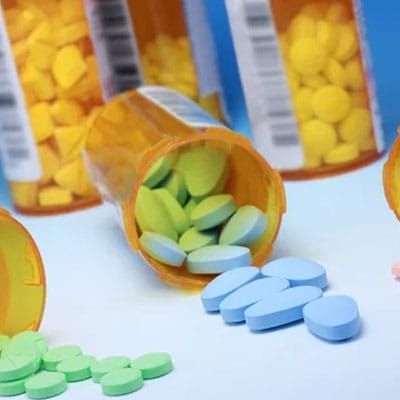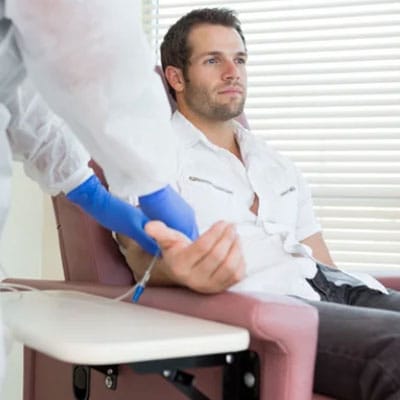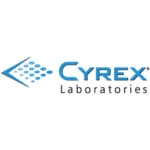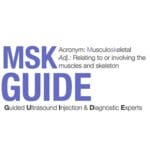Stem Cell IV Therapy for Crohn’s Disease
Stem cell treatments are revolutionizing regenerative medicine, and Stem Cell For Life has been leading the charge for over 10 years.
Want to know if Stem Cell Therapy will work for you?
Take our short questionnaire to find out.
Crohn’s disease Treatment
NOTE: Unlike other stem cell clinics, our comprehensive treatments include up to six months of follow-up visits.

Crohn’s Disease Symptoms
Crohn’s disease is an autoimmune condition in which the immune system targets intestinal cells.
This results in chronic inflammation, pain, and diarrhea which is disruptive to daily activities.
The cause is unknown and could be related to an unhealthy microbial environment and infections.
Medications and vaccines may also be implicated
The symptoms can be debilitating to live with and include diarrhea, urgency, fatigue, weak immune system, and joint pain.
In severe Crohn’s, fistulas may develop which are difficult to treat and result in repetitive surgical procedures and frequent antibiotics.
Other symptoms include lower abdominal cramping, bloating and nausea.
Patients have a difficult time gaining weight and get sick often due to a compromised immune system and chronic malnutrition.
A patient can tend to constipation or diarrhea, having 5-15 bowel movements per day.
Due to the urgency and frequent bowel movements, activities such as travel and work become challenging.
Crohn’s disease is progressive with no known cure.
Crohn’s Disease Treatments
Conventional treatments include prednisone, biologics, and surgery.
Prednisone is normally prescribed on a short term basis during a flare, although some patients take it on a daily basis.
Prednisone suppresses the immune system which controls the symptoms, however this does not result in healing.
The long term use of steroids weakens the bones and connective tissue, and increases the frequency of colds and illnesses.
Indeed, prednisone is not a viable long term solution for any patient.
The biologics are chemotherapy type drugs which are taken for long term for the purpose of preventing flares.
Unfortunately, most patients are not aware that they are taking a chemotherapy type medication with long term health risks such as cancer.
Despite these treatments, most patients end up having to get partial or full colectomies.
Our clinic wants to prevent this outcome by offering alternatives to symptom control and surgery.


How can a Stem Cell IV help with Crohn’s Disease?
Stem cells are produced in our bodies to help heal and regenerate injured or unhealthy tissue.
They also secrete substances that decrease inflammation in the body.
In autoimmune conditions there is an imbalance in the inhibitory part of the immune system.
The immune system becomes overactive which causes ongoing inflammation.
Stem cells help to bring the immune system back into balance, resulting in less inflammation.
They are also anti-microbial which is important in treating IBD.
Stem cells facilitate the healing and replacement of injured tissue with strong healthy tissue.
Stem cells have the ability to migrate to areas of injury where they will begin secreting valuable proteins to start the repair process.
What Results Can I expect from a stem cell infusion?
Many studies have been done in the last 20 years on the use of mesenchymal stem cells for Crohn’s patients which show positive results.
Our patients experience a decrease in symptoms within a few weeks after one stem cell infusion.
Dr. Jane Hendricks has treated IBD for 22 years and offers a 180 day regenerative program to her patients at no additional cost.
Want to know if Stem Cell Therapy will work for you?
Take our health questionnaire to find out.
What our Patients can
expect from us

Personalized treatment plans tailored to individual needs and health goals.

Comprehensive pre-treatment evaluation and ongoing progress monitoring

Access to cutting-edge regenerative medicine therapies
Start Your Personal Health Journey Now

#1. Discover Your Potential
Use our short survey to explore whether stem cell therapy is right for you.
Our carefully crafted questions will help us understand your unique situation and determine if you’re a good candidate for our treatments.

#2. Personalized Consultation
Schedule a one-on-one consultation with the doctor virtually or in person.
She’ll review your health questionnaire, discuss your health goals, and create a tailored treatment plan designed specifically for you.

#3. Begin Your Transformation
Start your personalized stem cell therapy program.
Our state-of-the-art treatments, combined with ongoing support and monitoring, will guide you on your journey to improved health and vitality.

#4. Embrace Your Renewed Health
Experience the benefits of your stem cell therapy. With the doctor’s one on one guidance, you’ll learn how to maintain your improved well-being, return to activities you love, and enjoy a higher quality of life.
Your transformation doesn’t end with treatment – it’s just the beginning of your revitalized future.






